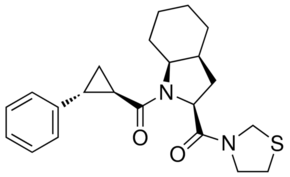All AbMole products are for research use only, cannot be used for human consumption.

For this product's availability, delivery time and price, please email [email protected] directly or click the "Inquiry Now" button below.
S-17092 is a potent, selective inhibitor of Prolyl oligopeptidase (POP), also known as prolyl endopeptidase (PEP or PE). Ki=1.5 nM. Nootropic.
S-17092 inhibition of POP prevents breakdown and thus increases the activity of a number of neuropeptides, which is likely the basis for its nootropic activity. S 17092 has been shown to improve cognition. It improved cognitive task performance in chronic low dose MPTP-treated monkeys. S-17092 was recently used to inhibit the formation of AcSDKP from its precursor 43-mer thymosin ?4 (T?4). Ac-SDKP is involved in hemopoietic stem cell differentiation, is pro-angiogenic and antifibrogenic.
| Molecular Weight | 384.53 |
| Formula | C22H28N2O2S |
| CAS Number | 176797-26-5 |
| Solubility (25°C) | DMSO: ≥10 mg/mL |
| Storage |
Powder -20°C 3 years ; 4°C 2 years In solvent -80°C 6 months ; -20°C 1 month |
| Related Products |
|---|
| 2-Deoxy-2-fluoro-D-glucose
2-Deoxy-2-fluoro-D-glucose is a radiolabeled glucose analog, which is commonly used in medical imaging techniques such as positron emission tomography (PET) scans. |
| 2-Bromo-4-chlorophenylacetic acid
2-Bromo-4-chlorophenylacetic acid is a biochemical reagent. |
| CPN-351 TFA
CPN-351 TFA is a selective pentapeptide antagonist of human NMUR1 with a pA2 of 7.35. CPN-351 TFA can be used for the research of inflammation. |
| 5-Phenyluracil
5-Phenyluracil is a pyrimidine derivative, a class of heterocyclic aromatic organic compounds crucial in biochemistry. It serves as a synthetic nucleoside analogue, meaning it mimics the structure of naturally occurring nucleosides like uridine. This structural similarity allows it to participate in biochemical reactions, often interfering with normal cellular processes, making it a valuable tool in studying nucleic acid metabolism and developing antiviral and anticancer agents. |
| 7-Deoxyloganin
7-Deoxyloganin is a biosynthetic precursor of Loganin. 7-Deoxyloganin undergoes hydroxylation catalyzed by 7-deoxyloganin 7-hydroxylase, a cytochrome P450-dependent monooxygenase, to produce Loganin. |
All AbMole products are for research use only, cannot be used for human consumption or veterinary use. We do not provide products or services to individuals. Please comply with the intended use and do not use AbMole products for any other purpose.


Products are for research use only. Not for human use. We do not sell to patients.
© Copyright 2010-2024 AbMole BioScience. All Rights Reserved.
